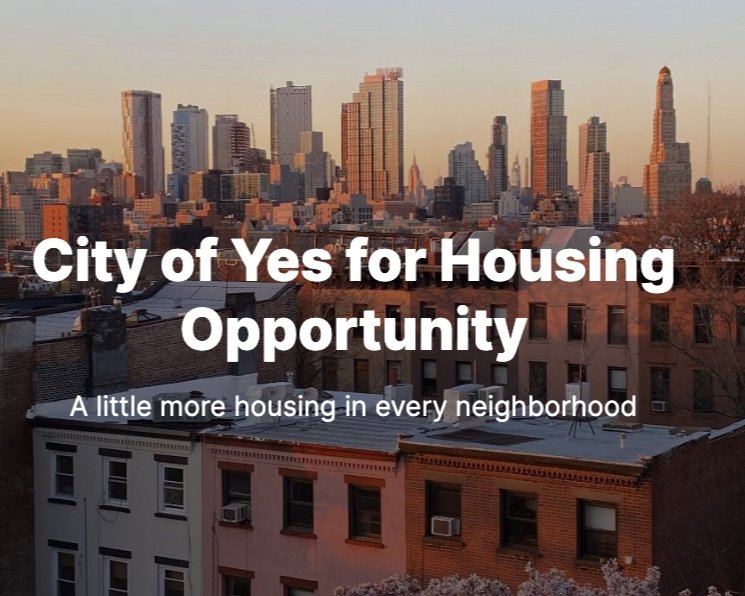
ending mandatory
parking minimums
REVITALIZE OUR CITY
—
IMPROVE OUR QUALITY OF LIFE
—
MAKE NYC MORE AFFORDABLE
—
REVITALIZE OUR CITY — IMPROVE OUR QUALITY OF LIFE — MAKE NYC MORE AFFORDABLE —
Every day, New Yorkers see, hear, and breathe the harmful effects of car dependence – streets feel unsafe, unwelcoming, and loud. The hidden harms – like high rates of asthma and poorer mental health – are even more consequential.
We build a lot of car parking in New York City – and that comes with severe costs. Rents are higher, business growth is smaller, streets are unsafe, and the environment is worse because of our prioritization of parking spots above all else. Here’s how to fix it.
PROBLEM
At a time when New York faces a severe housing affordability and climate crises, the city government has kept rules in place that prevent new housing units from being built, make walking around more difficult and dangerous, and contribute to poor health outcomes.
Dedicating space to cars incentivizes driving, flooding the streets with more vehicles and leading to increased chaos and congestion
Parking mandates increase the cost of construction, disincentivizing new housing production and, in turn, raising rents.
Building below-ground parking can cost an estimated $150,000 per space. And from a cost perspective, for every 1.2 parking spaces built, one apartment is lost.
Why are there so many cars on the street?
Parking mandates incentivize people to own and drive cars. As more people drive and cities invest more in car-centered infrastructure, streets become less welcoming to walking, biking, or public transit. A vicious cycle is created, where investing in car culture creates more car culture to the detriment of street safety and people-centered design. Parking mandates help create this vicious cycle.
Parking mandates create a self-perpetuating cycle of car-dependence
SOLUTION
Removing parking mandates is not a radical, far-fetched, or unprecedented proposal. Dozens of cities across the country including Buffalo, San Francisco, and Minneapolis have already lifted mandates — not to mention that 67% of New Yorkers already support it. Crucially, it will not lead to a future where no more parking is created.
In 2017, Buffalo — where there is far less public transit infrastructure than in New York — removed parking mandates. In the following years, 47% of large new buildings in Buffalo built less parking than used to be required — but not no parking. And 53% of buildings continued to build as much or more parking as previously required. Lifting parking mandates is feasible, tested, and represents the right path for New York City to take.
10 Benefits to Lifting Parking Mandates
Parking mandates take up valuable space in residential buildings that could be used to house people rather than cars.
-
New York City’s parking minimums are inflating rents by as much as 17%. In Minneapolis, rents fell by more than $200 a month in new studios after parking minimums were relaxed.
-
Parking mandates prioritize the needs and interests of the ~25% of New Yorkers who use cars to commute, thereby encouraging car-centric infrastructure. If these mandates were lifted, the City could better prioritize funding active and public transportation.
-
Transportation is the second-leading cause of climate change-causing emissions in New York City. Parking minimums incentivize people to own and drive cars, leading to increased traffic congestion and the harmful emissions that worsen health outcomes for all New Yorkers and disproportionately impact low income communities.
-
As heat waves increase in duration and intensity, it will also be critical to build green spaces that cool down neighborhoods, rather than parking lots that dramatically increase the heat island effect.
-
The current zoning code complexity burdens everyone responsible for building more housing. Civil servants and builders alike spend endless hours navigating a maze of zoning code, instead of focusing on and funding new housing and commercial projects.
-
San Francisco, Minneapolis, Buffalo, and dozens of other cities big and small have ended parking minimums and brought rents down without reducing parking in the neighborhoods that need it. Eliminating parking minimums is already working in several cities in our state and would bring the city up to par with the smartest cities in the country.
-
Mandatory parking spots are expensive for businesses to build. Especially with changing commuting patterns, particularly in central commercial districts, New York needs to preserve flexibility in its retail spaces to accommodate new and changing businesses — especially small, local businesses.
-
Black and brown New Yorkers living in the Bronx, Queens and Brooklyn disproportionately suffer from asthma and other vehicle-exhaust-related illnesses, while wealthy, white Manhattanites benefit from lower emissions and safer streets because parking mandates have already been lifted in most of their borough. Similarly, streets in neighborhoods of color are often the least safe, and reducing our city’s reliance on cars helps reverse that trend.
-
Parking minimums impede the walkability of our neighborhoods and harm street life by making it more likely that developers will build street level parking garages rather than retail. Additionally, surface parking lots push buildings apart and create neighborhoods where residents have to drive because walking is impossible or unpleasant.
-
Parking lots contribute to flash flood events, and reducing the amount of asphalt we build makes our city more resilient. Instead of building parking lots, we can build green space that absorbs rain and flood waters.
Public comment
open through
November 6, 2023
Department of City Planning has proposed fully eliminating residential parking mandates in the City of Yes Zoning for Housing Opportunity text amendment. It is crucial for New Yorkers to show strong support at this time and tell City leaders that we want a future free of mandatory parking minimums and their negative impacts.
Lift Parking Mandates NYC | 2023




